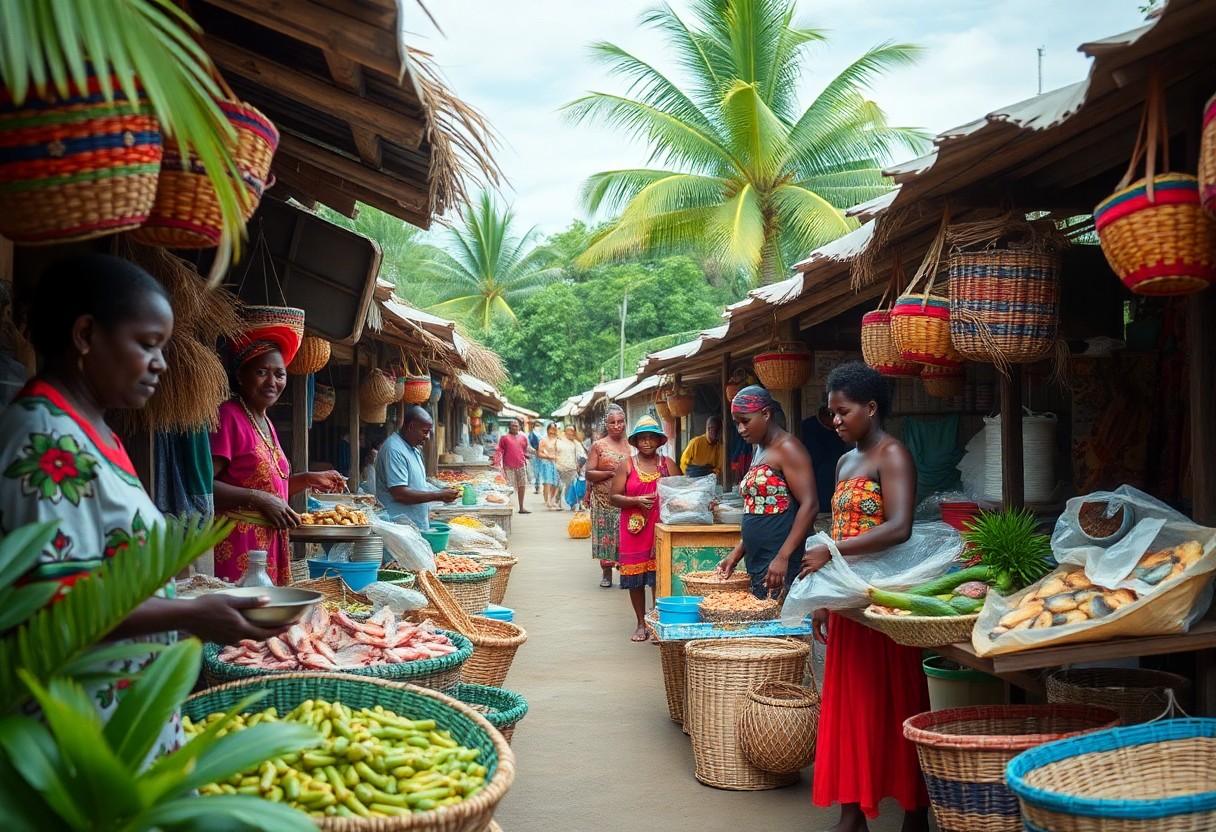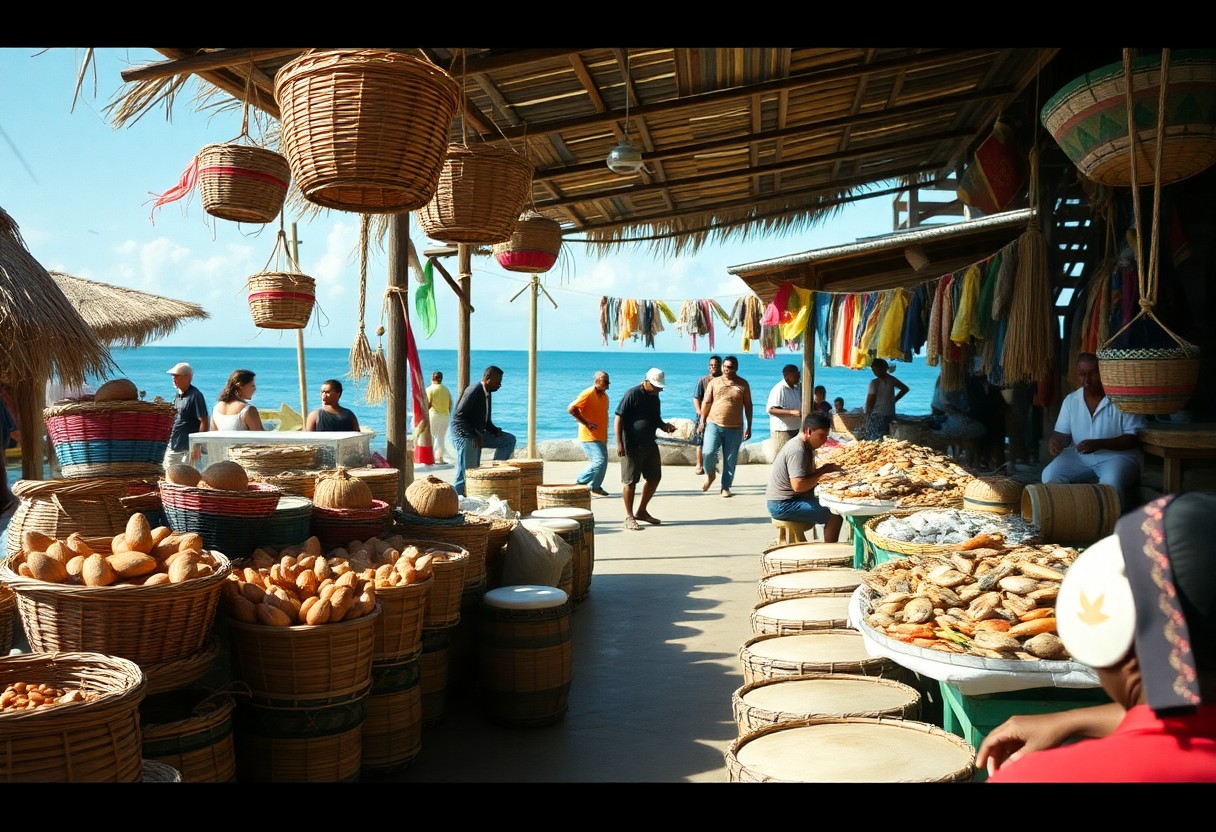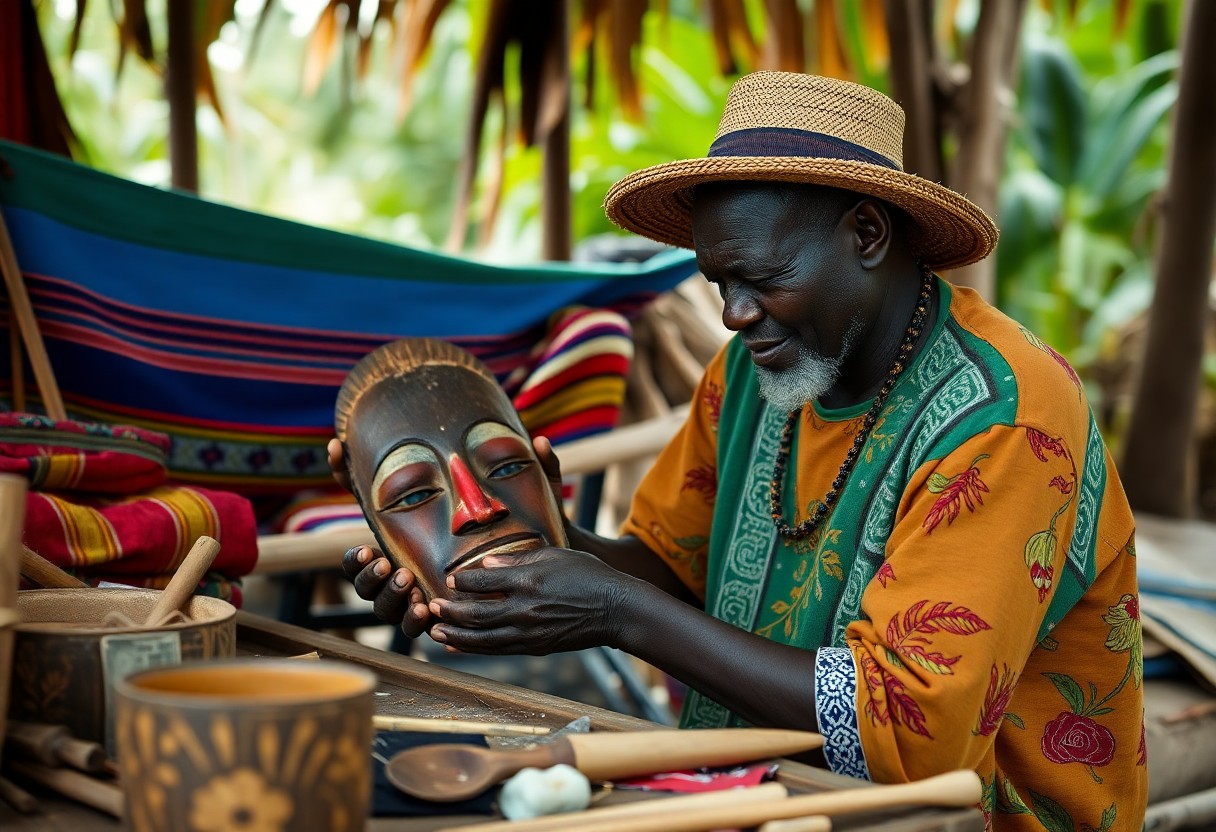Nestled just a short distance from the breathtaking Caribbean Sea, Hopkins Village in Belize is a picturesque Garifuna village that offers a remarkable opportunity to immerse yourself in its lively culture and deep-rooted traditions. This extensive Hopkins Village guide will lead you through its vibrant history, delectable cuisine, local festivities, and musical heritage, enabling a genuine connection with the Garifuna community. Whether you’re on the hunt for exhilarating adventures or a peaceful retreat, this cultural hub promises unique experiences that will enrich your Belize trip in unforgettable ways.

Discover the Rich Tapestry of the Garifuna Identity
The Garifuna people, predominantly found in vibrant locations like Hopkins Village, embody a remarkable blend of African and Caribbean heritage. This intricate identity is vividly showcased through their dynamic music, traditional dances, and exquisite culinary traditions. The core of Garifuna culture celebrates resilience and community spirit, inviting you to engage with their customs and daily life, which in turn provides a deeper insight into their societal values and rich historical narrative. By immersing yourself in the Garifuna way of life, you will uncover profound stories and experiences that reflect the essence of their vibrant culture.
Exploring the Historical Roots and Journey of the Garifuna People
The origins of the Garifuna trace back to the intermingling of West African slaves and the indigenous Arawak and Carib peoples on the island of St. Vincent. In 1797, following British colonization, the Garifuna were forcibly exiled to the shores of Central America, where they established communities in present-day Honduras, Belize, Guatemala, and Nicaragua. This migratory journey has cultivated a resilient culture that has thrived through generations, now vividly preserved in places like Hopkins Village, which stands as a testament to their enduring legacy and cultural richness.
Unveiling the Cultural Significance of Language and Heritage
The Garifuna language, recognized as an intangible cultural heritage by UNESCO, plays a vital role in conserving the identity of the Garifuna community. It encapsulates their history, philosophy, and worldview, establishing a strong connection to their cultural realities. Speaking Garifuna transcends simple communication; it serves as a crucial tool for cultural preservation that strengthens community bonds and enhances the sharing of traditional knowledge, stories, and values across generations.
Understanding the importance of language within Garifuna culture reveals profound layers of meaning. The Garifuna language embodies expressions deeply rooted in the community’s unique experiences, traditions, and connections to the land. With over 40,000 speakers, this dialect functions not only as a means of communication but also as a powerful symbol of resistance against cultural erasure. Through music, chants, and oral storytelling, the Garifuna articulate their identities, histories, and lived experiences, fostering a rich environment where culture flourishes in Hopkins Village. Engaging with the Garifuna language opens a gateway to comprehending their vibrant heritage and highlights the strength of unity within diversity.

Immerse Yourself in the Heartbeat of Garifuna Music and Dance
Garifuna music and dance are the lifeblood of the cultural experience in Hopkins Village, transforming gatherings and celebrations into unforgettable occasions. Rich in history and tradition, these artistic forms not only provide entertainment but also act as expressive mediums for storytelling that resonate with the community’s deep heritage. The pulsating rhythms carry a powerful sense of identity, inviting both locals and visitors to partake in a vibrant cultural immersion that is both rhythmically captivating and visually stunning.
Understanding the Rhythms: The Essential Role of Drumming
Drumming is the heartbeat of Garifuna music, primarily performed on traditional hand-crafted drums known as pounders. These instruments create captivating rhythms that are essential for community dances and rituals. Drummers skillfully blend complex syncopations, often using their entire bodies to drive the rhythm, creating an atmosphere where everyone can feel the vibrations. This shared experience becomes a unifying force, bringing the community together in joyous celebration while honoring their ancestors and cultural heritage.
Traditional Dances: Conveying Stories Through Movement
Each traditional dance within the Garifuna culture narrates a unique story, intertwining history, emotions, and cultural practices. The *Hungu Hungu* and *Danza de los Hombres Nuevos* exemplify how movement illuminates the narratives of the Garifuna people. Dancers frequently adorn themselves in vibrant costumes, creating a colorful festival that enhances the experience. With every twist, turn, and leap, the dances capture the spirit and resilience of the Garifuna, weaving a living tapestry rich in significance that draws you deeper into the essence of their culture. Through these dances, community stories are shared, enveloping both audiences and performers in a united celebration of identity and history.
Embark on a Culinary Adventure: Discovering Garifuna Gastronomy
Delving into the culinary landscape of Hopkins Village provides a delectable glimpse into Garifuna culture, characterized by distinctive flavors and traditional cooking practices. The cuisine acts as a beautiful reflection of the community’s heritage, featuring ingredients sourced directly from the Caribbean Sea and the surrounding land. Influences from African, Indigenous, and Caribbean culinary traditions merge seamlessly to create dishes that not only tantalize the palate but also serve as testaments to the vibrant culture.
Signature Dishes and Their Cultural Significance
Among the culinary highlights are Hudut, a savory fish and coconut milk soup paired with mashed green plantains, and Darasa, a traditional fish cake made from cassava. Each dish tells a story of resourcefulness and community, as these cherished recipes have been passed down through generations, connecting you to the Garifuna people’s origins and their profound relationship with the land and sea. When you indulge in these meals, you’re not just enjoying food; you’re partaking in a cultural narrative that enriches your understanding of the Garifuna way of life.
Traditional Cooking Techniques: Preserving Cultural Heritage in the Kitchen
Garifuna cooking preserves its cultural legacy through a variety of time-honored techniques that have been handed down through generations. Methods such as steaming, boiling, and utilizing natural ingredients characterize this culinary style, while traditional utensils like the calabash serve both functional and cultural purposes in the kitchen.
Steaming fish wrapped in banana leaves exemplifies the emphasis on maintaining moisture and flavor, ensuring that the integrity of the ingredients is respected. Similarly, techniques like pounding cassava into flour for Darasa highlight both skill and tradition. Through these culinary methods, you not only savor the rich flavors of Garifuna cuisine but also participate in a cultural legacy that honors ancestral practices and sustainable living. This culinary journey through Hopkins Village deepens your understanding of the Garifuna way of life, where food transcends mere sustenance and becomes a medium for storytelling and community bonding.
Engaging with the Vibrancy of Festivals and Cultural Celebrations
Hopkins Village bursts with energy during its lively festivals, which play a crucial role in preserving Garifuna culture. These celebrations are filled with music, dance, and culinary delights that reflect the rich history and traditions of this unique community. From the rhythmic beats of drumming to the soulful melodies of Garifuna songs, each festival becomes a vibrant expression of identity and heritage. Streets are adorned with decorations, and locals don traditional attire, showcasing their pride and passion for their culture.
Participating in the Rituals of Garifuna Settlement Day
Garifuna Settlement Day, celebrated on November 19th, is a cornerstone of the community, commemorating the arrival of the Garifuna people to Belize. This significant day features a blend of solemn remembrance and joyous celebration, where you can witness a ceremonial reenactment of the landing, complete with vibrant parades showcasing traditional attire, drumming, and dancing. The rituals include offerings of food to ancestors, singing folk songs, and sharing stories that bridge the past with the present, reinforcing the collective memory of resilience and cultural pride.
Additional Key Festivals and Their Role in Strengthening Community Bonds
Beyond Settlement Day, other significant observances play essential roles in nurturing community ties and cultural expression. The New Year and the Feast of Saint Peter are among the festivities that highlight the vibrant spirit of the Garifuna people. Food, dance, and music serve as critical components, providing you with opportunities to engage in experiences that enhance communal bonds. Participating in these events enriches your understanding of Garifuna heritage and offers a chance to witness the seamless blend of spirituality, tradition, and joy that permeates the community.

Honoring Artistic Expression in Daily Life: The Craftsmanship of the Garifuna
The vibrant culture of Hopkins Village showcases the rich artistry that infuses everyday life, thanks to the skill and creativity of the Garifuna people. From the intricate patterns and colors found in traditional clothing to the diverse textures of handmade crafts, each piece reflects a profound connection to their heritage and the natural environment. You’ll discover that Garifuna craftsmanship serves not only as a means of artistic expression but also as a powerful tool for preserving cultural identity and sharing stories from the past with future generations.
Traditional Crafts: Weaving, Carving, and More
Traditional crafts form the backbone of Garifuna artistry, with techniques in weaving, carving, and other forms passed down through generations. You may encounter beautifully woven baskets and stunning textiles, each piece narrating a story or reflecting an aspect of community life. Wood carvings of animals, mythological figures, and everyday objects serve as functional items while simultaneously representing cultural narratives that connect you to the Garifuna’s ancestral roots.
Modern Influences and the Transformation of Garifuna Art Forms
Contemporary influences have significantly shaped the evolution of Garifuna art, merging traditional skills with modern techniques and global art movements. Innovative artists from Hopkins Village are incorporating mixed media, vibrant colors, and unconventional forms, expanding their reach beyond local markets. This evolution does not diminish cultural significance; rather, it revitalizes Garifuna artistry, allowing you to experience a dynamic fusion of the past and present that reflects contemporary stories and perspectives.
The rise of contemporary artistry has fostered exciting collaborations between Garifuna artists and international creatives, resulting in projects that resonate with broader audiences. Initiatives such as art exhibitions and workshops not only showcase the depth of Garifuna traditions but also create platforms for dialogue on identity and cultural resilience. You will find that this flourishing artistic scene stands as a testament to the strength of the Garifuna spirit, adapting and thriving while maintaining deep-rooted cultural connections.
Fully Immersing Yourself in the Experience of Hopkins Village
Your journey through Hopkins Village in Belize reveals a unique opportunity to engage with the vibrant Garifuna culture. This detailed Hopkins Village guide provides everything you need to appreciate the rich traditions, delicious cuisine, and the warm community spirit of this coastal gem. By immersing yourself in local festivals and engaging with the Garifuna people, you will create lasting memories and deepen your understanding of their heritage. As you plan your visit, seize the opportunities for cultural exchange and adventure that await you in this enchanting Garifuna village.
Your Essential FAQs: Understanding Hopkins Village and Garifuna Culture
Q1: What makes Hopkins Village a Distinctive Travel Destination?
A: Hopkins Village, located along the beautiful coast of Belize, is celebrated for its vibrant Garifuna culture. This charming community is often referred to as the cultural hub of the Garifuna people, where visitors can engage with their rich traditions, music, dance, and culinary delights. The village features stunning beaches, local artisans, and an authentic atmosphere, making it a must-visit destination for anyone interested in exploring the unique heritage of the Garifuna community.
Q2: How can I Fully Experience Garifuna Culture while in Hopkins Village?
A: To truly immerse yourself in Garifuna culture in Hopkins Village, consider participating in local events such as drumming and dance performances, which are frequently held in the village square. Additionally, visiting Garifuna-run restaurants allows you to savor traditional dishes like hudut (a flavorful fish soup with plantains) while enjoying live music. Guided tours are also available, providing insights into the history and significance of Garifuna practices by connecting you with local artisans, musicians, and cultural leaders.
Q3: What Activities are Available in Hopkins Village Beyond Cultural Experiences?
A: In addition to exploring Garifuna culture, Hopkins Village offers a diverse range of activities suitable for all types of travelers. Nature enthusiasts can engage in snorkeling or diving at nearby barrier reefs, while those seeking relaxation can unwind on pristine beaches. Other popular outdoor pursuits include kayaking, paddleboarding, and exploring the surrounding mangroves. Visitors can also venture to nearby attractions like the Cockscomb Basin Wildlife Sanctuary and the Mayflower Bocawina National Park for hiking and birdwatching opportunities.
Q4: When is the Optimal Time to Visit Hopkins Village for Pleasant Weather?
A: The best time to visit Hopkins Village for enjoyable weather typically falls between late November and mid-April, coinciding with Belize’s dry season. During these months, visitors can experience warm temperatures, reduced rainfall, and a variety of cultural events. However, each season has its unique charms, and those looking to enjoy less crowded attractions might consider visiting during the shoulder months of May or November for a more tranquil atmosphere.
Q5: What Types of Accommodations are Available in Hopkins Village?
A: Hopkins Village offers a variety of lodging options to cater to different budgets and preferences. From charming guesthouses and beachfront cabanas to eco-friendly resorts, visitors can find accommodations that suit their needs. Many establishments are locally owned and managed, allowing guests to enjoy personalized experiences and the warm hospitality of Garifuna culture. It’s advisable to book accommodations in advance, especially during peak travel seasons, to secure the best options available.
In summary, Hopkins Village is a vibrant destination in Belize that serves as a cultural hub for the Garifuna community. Whether you’re indulging in traditional cuisine, engaging with local artisans, or enjoying outdoor adventures, there are countless opportunities to experience the richness of Garifuna culture. Visitors will find a plethora of accommodations and a welcoming atmosphere, positioning it as a key destination in Belize. Ideal for both cultural enthusiasts and nature lovers, Hopkins Village blends breathtaking landscapes with profound cultural experiences.
The Article Hopkins Village Belize: Complete Guide to Garifuna Culture Hub appeared first on Belize Travel Guide
The Article Garifuna Culture Hub: Your Complete Guide to Hopkins Village Belize Was Found On https://limitsofstrategy.com

